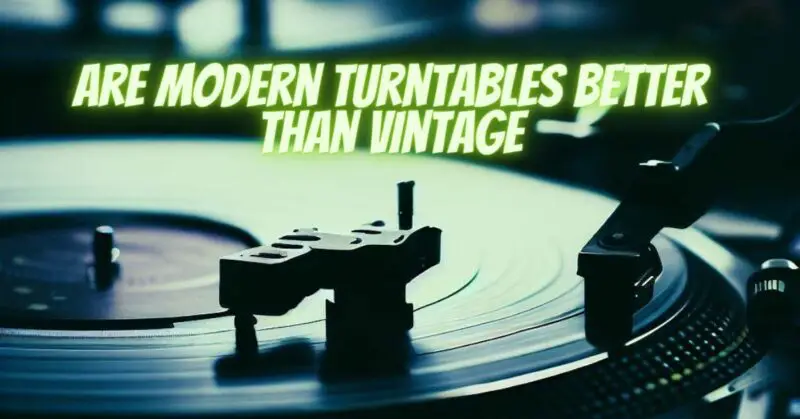The debate between modern turntables and vintage ones has been a topic of discussion among vinyl enthusiasts and audiophiles for decades. Both modern and vintage turntables have their unique characteristics, and each has its dedicated following. In this article, we will explore the features and qualities of both modern and vintage turntables and examine whether one is inherently superior to the other in terms of sound quality, build, and overall performance.
Modern Turntables: Advancements and Innovations
Modern turntables have seen significant advancements and innovations in technology, design, and materials. Manufacturers have utilized new materials and engineering techniques to create turntables that boast improved speed accuracy, reduced vibration, and enhanced durability. Some advantages of modern turntables include:
- Precision Engineering: Modern turntables often feature precision-engineered components and advanced motor systems that provide more accurate speed control, resulting in consistent and stable playback.
- Isolation and Vibration Control: Many modern turntables incorporate advanced isolation and vibration control mechanisms to minimize external disturbances and improve overall sound quality.
- High-Quality Materials: Manufacturers use high-quality materials like carbon fiber, aluminum, and composite plinths to enhance the turntable’s rigidity and reduce resonance.
- Convenience Features: Modern turntables may come with built-in phono preamps, USB connectivity for digitizing records, and wireless streaming options, offering increased versatility and convenience.
Vintage Turntables: Classic Charm and Timeless Appeal
Vintage turntables hold a unique charm and a nostalgic appeal for audiophiles. They hark back to a bygone era and are sought after for their vintage aesthetics and classic features. Some advantages of vintage turntables include:
- Time-Tested Quality: Vintage turntables from reputable brands were often built with high-quality materials and craftsmanship, contributing to their longevity and reliability.
- Analog Warmth: Some vinyl enthusiasts appreciate the analog warmth and character provided by vintage turntables, especially those sourced from analog recordings of the past.
- Vintage Components: Vintage turntables often feature classic tonearms and cartridges that have achieved legendary status for their sound quality and musicality.
- Collectible Value: Vintage turntables, especially those in excellent condition or with rare features, can hold significant collectible value among vinyl enthusiasts and collectors.
The superiority of modern turntables over vintage ones or vice versa ultimately depends on personal preference and individual listening priorities. Modern turntables offer technological advancements and convenience features that cater to modern lifestyles, while vintage turntables hold nostalgic appeal and vintage aesthetics.
When it comes to sound quality, both modern and vintage turntables can deliver excellent performance. The critical factors influencing sound quality are the overall build quality, turntable setup, cartridge selection, and the quality of the vinyl pressing.
Ultimately, the choice between modern and vintage turntables should be based on individual preferences, budget constraints, and the desired listening experience. Whether you opt for the precision of modern engineering or the timeless appeal of vintage craftsmanship, both types of turntables can provide a magical and immersive vinyl listening experience that captivates audiophiles and music lovers alike.


